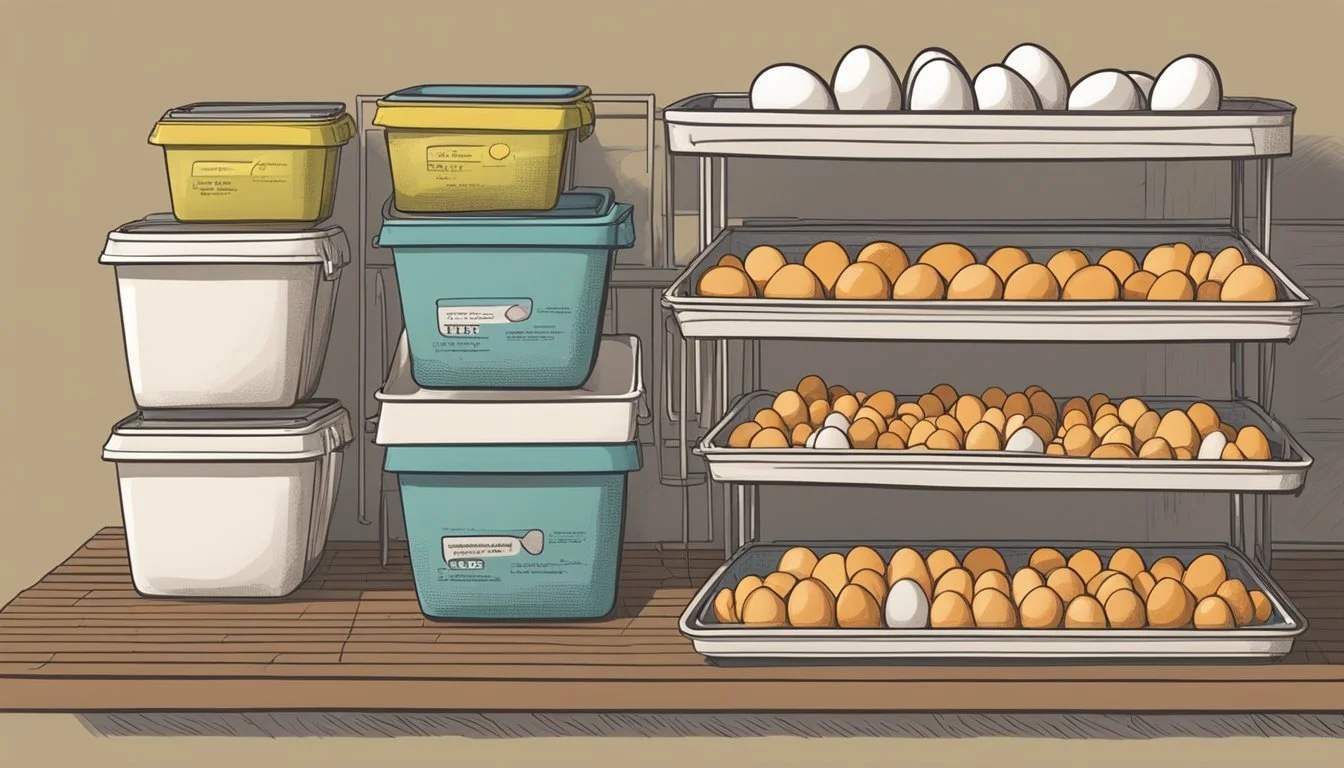How Often Should I Collect Eggs
Optimal Frequency for Freshness and Health
When raising chickens, one crucial aspect of care is the collection of eggs. Eggs should be collected daily to ensure they are fresh and to minimize the chances of them becoming dirty, broken, or eaten by hens or predators. The frequency of egg collection can also be influenced by the nesting habits of the chickens, the cleanliness of the coop, and the ambient temperature which might affect the egg's freshness.
Proper egg collection ensures that eggs are safe for consumption and preserves their quality. It mitigates the risk of bacterial contamination and avoids attracting unwanted pests to the coop. Additionally, regular collection discourages broody behavior in hens that may want to sit on the eggs to hatch them. This is essential for those who are not interested in raising chicks and only intend to produce eggs.
Thorough egg collection routines become a part of daily life for chicken keepers, and the practice can be adjusted as needed based on the specific conditions of their coop and flock. It is important to have a system in place for storing the collected eggs, such as keeping them at a consistent temperature to maintain their freshness until they are ready for use or sale.
Understanding the Egg-Laying Process
Egg collecting is a crucial aspect of poultry management, ensuring the health of chickens and the quality of the eggs produced. Understanding the behaviors associated with laying and the process of egg production is vital for efficient poultry farming.
Natural Chicken Behavior and Broodiness
Broody hens are chickens that show a strong natural instinct to hatch eggs, including both fertilized and unfertilized ones. This behavior includes sitting persistently on a clutch of eggs to incubate them and may include resistance to leaving the nest for food or water. Broodiness interrupts regular egg-laying patterns, as a brooding hen will stop laying new eggs. Farmers may choose to either use this instinct for natural egg incubation or discourage it to resume egg production.
Egg Production and Frequency
Chickens typically lay one egg approximately every 24 to 26 hours, but this can vary based on factors like breed, age, and health. The egg-laying process involves a complex interplay of hormones and physiological changes. Once an egg is laid, it's important to collect chicken eggs frequently to prevent them from getting dirty, to reduce the chances of breakage, and to discourage broody behavior. In hot climates, eggs should be collected at least twice a day to maintain freshness and prevent spoilage.
Setting Up for Success
When considering how often to collect eggs, the foundation of success lies in an optimally designed chicken coop and robust safety measures against predators. The goal is to create a conducive environment for the hens to lay eggs and ensure their protection throughout the process.
Proper Coop Design
A well-designed chicken coop not only encourages regular egg laying but also simplifies the egg collection process. The nesting boxes should be spacious enough to accommodate the hens, yet cozy to make them feel secure. It is important that the nesting area is filled with clean, soft bedding, such as straw or wood shavings, to keep the eggs clean and unbroken. Strategic positioning of nesting boxes can facilitate easy access for daily collection.
Safety Measures Against Predators
Protecting the flock from predators such as rats, snakes, raccoons, foxes, and possums is crucial. Coop security should involve sturdy construction with no gaps larger than half an inch to discourage rodents and other small predators. Installing predator-proof latches on doors and making sure the coop and run are well enclosed with hardware cloth can prevent larger predators from gaining access. Regular checks for signs of attempted entry or weakness in the structure will ensure the chickens and their eggs remain safe.
The Daily Routine of Egg Collection
Engaging in a consistent daily routine for egg collection ensures the eggs remain fresh and reduces the risks of undesirable behaviors and conditions such as egg-eating by chickens or spoilage. This section will outline the best practices for when to collect eggs and how to manage broody hens and egg-eating behaviors.
Optimal Times to Collect Eggs
Egg collection should preferably happen at least once a day to maintain egg quality and deter pests. Chickens typically lay eggs in the morning, within the first six hours after sunrise. Therefore, the prime time for egg collecting is during this period. If time and resources allow, a subsequent collection in the afternoon can further ensure that eggs are retrieved in a fresh state.
Dealing with Broody Hens and Egg-Eating Behaviors
Broody hens can often disrupt the egg-collecting routine. They may sit on eggs with the intent to hatch them, even if the eggs are unfertilized. To address this, one may remove the broody hen from the nest and collect the eggs as usual. If broodiness persists, consider providing a separate nesting area or using a fake egg to discourage the behavior.
Egg-eating is another habit that can form if eggs are left in the coop for too long. This destructive behavior can be prevented by collecting eggs daily and ensuring that nests are kept clean and free from broken eggs. If one identifies an egg-eating habit, it may be necessary to isolate the offending chicken and adjust the protein content in their feed which can be a contributing factor to this behavior.
Egg Handling and Care
In managing the quality and safety of eggs from backyard flocks, timely collection and proper cleaning are critical, followed by correct storage methods to maintain freshness and extend shelf life.
Cleaning and Handling Eggs
Collection frequency is vital; one should collect eggs at least twice a day. Frequent collecting reduces the chances of eggs becoming soiled or damaged. If an egg is covered in chicken poop or significantly dirty, it may need more than just a dry wipe. In these cases, the eggs should be washed in water that's warmer than the egg's temperature. According to Penn State Extension, using water at 90°F or higher, which is at least 20°F greater than the egg's temperature, is ideal. A cleaning compound approved for use with eggs can be employed, followed by a rinse with an approved sanitizer to ensure the eggs are safe to eat.
When cleaning eggs, one must use warm water since cold water could cause the egg's contents to contract and potentially draw in bacteria. Lightly soiled eggs might only need a wipe with a damp cloth. For eggs with minor spots, a gentle rub with a soft cloth or sponge can suffice. It is important to handle eggs gently to avoid cracking the shells, which can lead to contamination.
Storage Best Practices
Once eggs are cleaned, they should move to the storage phase to retain freshness. The recommendation for storing eggs revolves around temperature consistency. Storing eggs in a refrigerator at 40°F or colder soon after collection will help maintain their freshness. The shelf life of refrigerated eggs can be substantial, typically around 3 to 5 weeks.
Eggs should be placed in egg cartons with the pointy end facing downward. This position helps keep the yolk centered and the air cell intact, which may prolong the egg's freshness. Eggs should not be stored in the refrigerator door, as the temperature fluctuates with frequent opening and closing, which can affect their quality. Keep them in the main compartment to ensure a more stable environment.
Remember to date the egg cartons upon storing, so one can keep track of their freshness and utilize them within an appropriate time frame, helping to maintain a rotation of fresh eggs and ensuring they remain safe to eat.
Dealing with Common Challenges
Collecting chicken eggs efficiently requires overcoming hurdles such as adverse weather and handling compromised eggs. The following outlines strategies to deal with these common issues in raising chickens.
Managing Poor Weather Conditions
Collecting eggs during periods of extreme temperatures or heavy precipitation presents a challenge for backyard chicken owners. To mitigate the impact of severe weather on egg collection:
In hot weather, ensure adequate water and shade are available to prevent overheating both for the chickens and their eggs. Collect eggs more frequently to avoid spoilage.
During cold spells, collect eggs before they freeze. Frozen eggs may crack, compromising their safety and quality. Insulation and gentle heating can be used in the coop to maintain a stable environment.
Addressing Broken or Soiled Eggs
Broken or soiled eggs are an occasional inevitability in egg collection. Here's how to handle them:
Regularly check nest boxes for cleanliness, and remove any soiled eggs promptly, as bacteria from feces can penetrate eggshells and contaminate the egg.
Gather eggs gently to avoid breakage. If eggs are broken, clean the nest immediately to prevent other eggs from being soiled and discourage chickens from acquiring a taste for their eggs.
Advanced Techniques and Considerations
In the pursuit of optimal egg collection practices, enthusiasts must give due attention to enhancing fertility through incubation and addressing problematic behaviors like egg-eating in the flock.
Incubating for Fertility
For those interested in breeding and incubating chickens, regular egg collection is critical. One should collect fertilized eggs at least twice a day to maintain their viability for incubation. Ensuring that eggs are not left in the coop too long is essential to prevent exposure to extreme temperatures and bacteria that can compromise their quality. A key factor in successful incubation is the egg's bloom, a natural coating that protects the egg from contamination; this should be preserved by minimizing handling and avoiding washing eggs meant for incubation.
Using Fake Eggs to Combat Egg-Eating
When dealing with egg-eating habits within a flock, incorporating fake eggs can be an effective strategy. These decoys can help deter the behavior by frustrating the chickens when they attempt to peck and eat them. It is recommended to use fake eggs that closely mimic the weight and texture of real eggs. Additionally, frequent collecting eggs reduces the temptation for chickens to start or continue the habit of egg-eating. Keeping nest boxes clean and collecting eggs regularly are essential practices to reduce the risk of this unwanted behavior.







